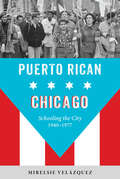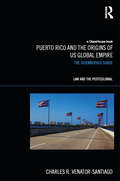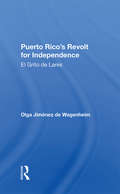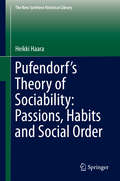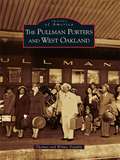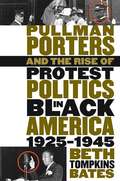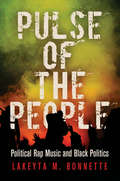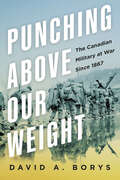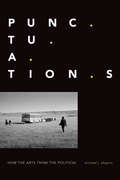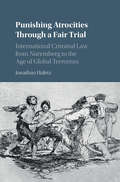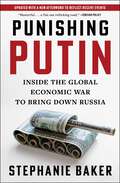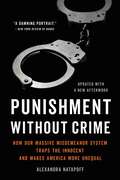- Table View
- List View
Publishing The Prince
by Jacob SollRevising the orthodox schema of the public sphere in which political authority shifted away from the crown with the rise of bourgeois civil society in the eighteenth century, Soll shows for the first time how the public sphere in fact grew out of the learned and even royal libraries of erudite scholars and the bookshops of subversive, not-so-polite publicists of the republic of letters.
Puerto Rican Chicago: Schooling the City, 1940-1977 (Latinos in Chicago and Midwest)
by Mirelsie VelazquezThe postwar migration of Puerto Rican men and women to Chicago brought thousands of their children into city schools. These children's classroom experience continued the colonial project begun in their homeland, where American ideologies had dominated Puerto Rican education since the island became a US territory. Mirelsie Velázquez tells how Chicago's Puerto Ricans pursued their educational needs in a society that constantly reminded them of their status as second-class citizens. Communities organized a media culture that addressed their concerns while creating and affirming Puerto Rican identities. Education also offered women the only venue to exercise power, and they parlayed their positions to take lead roles in activist and political circles. In time, a politicized Puerto Rican community gave voice to a previously silenced group--and highlighted that colonialism does not end when immigrants live among their colonizers. A perceptive look at big-city community building, Puerto Rican Chicago reveals the links between justice in education and a people's claim to space in their new home.
Puerto Rican Soldiers and Second-Class Citizenship: Representations in Media
by Manuel G. Avilés-SantiagoPuerto Rican soldiers have been consistently whitewashed out of the narrative of American history despite playing parts in all American wars since WWI. This book examines the online self-representation of Puerto Rican soldiers who served during the War on Terror, focusing on social networking sites, user-generated content, and web memorials.
Puerto Ricans: Born In The U.s.a.
by Clara E RodriguezThis book examines the contexts into which Puerto Rican immigrants to the United States stepped, and the results of their interaction within those contexts. It focuses mainly on New York City, essentially a social history of the post-World War II Puerto Rican community.
Puerto Rico Is in the Heart: Emigration, Labor, and Politics in the Life and Work of Frank Espada
by Edward J. CarvalhoSet against the backdrop of contemporary US economic history, Puerto Rico Is in the Heart examines the emigration, labor, and political experiences of documentary photographer, human rights activist, and Puerto Rican community leader Frank Espada and considers the cultural impact of neoliberal programs directed at Puerto Rico and Puerto Ricans.
Puerto Rico and the Origins of U.S. Global Empire: The Disembodied Shade (Law and the Postcolonial)
by Charles R. Venator-SantiagoDrawing on a postcolonial legal history of the United States’ territorial expansionism, this book provides an analysis of the foundations of its global empire. Charles R. Venator-Santiago argues that the United States has developed three traditions of territorial expansionism with corresponding constitutional interpretations, namely colonialist, imperialist, and global expansionist. This book offers an alternative interpretation of the origins of US global expansion, suggesting it began with the tradition of territorial expansionism following the 1898 Spanish–American War to legitimate the annexation of Puerto Rico and other non-contiguous territories. The relating constitutional interpretation grew out of the 1901 Insular Cases in which the Supreme Court coined the notion of an unincorporated territory to describe the 1900 Foraker Act’s normalization of the prevailing military territorial policies. Since then the United States has invoked the ensuing precedents to legitimate a wide array of global policies, including the ‘war on terror’. Puerto Rico and the Origins of US Global Empire: The Disembodied Shade combines a unique study of Puerto Rican legal history with a new interpretation of contemporary US policy. As such, it provides a valuable resource for students and scholars of the legal and historical disciplines, especially those with a specific interest in American and postcolonial studies.
Puerto Rico's Revolt For Independence: El Grito De Lares
by Olga Jimenez De WagenheimThis book is a socioeconomic interpretation of Puerto Rico's first and most significant attempt to end its colonial relationship with Spain. Looking at the imperial policies and conditions within Puerto Rico that led to the 1868 rebellion known as "El Grito de Lares," Dr. Jiménez de Wagenheim compares the colonization of Puerto Rico with that of Spanish America and explores the reasons why the island's independence movement began decades after Spain's other colonies in the region had revolted. Through the extensive use of previously unresearched archive material, she examines the economic and social backgrounds of the leaders of the rebel movement, corrects many errors of earlier accounts of the revolt, and offers new interpretations of its impact on Spanish-Puerto Rican relations.
Pues yo lo veo así
by Xavier Sala i MartínCon rigor y sencillez, Xavier Sala i Martín explica tanto a los entendidos como a los neófitos las bases de la economía y del sistema económico mundial. La actual crisis financiera, definida por el autor como una de las más importantes de los últimos cien años, centra gran parte de sus últimos artículos periodísticos, que han sido recogidos en este libro. Asimismo, también nos ofrece su opinión sobre temas como el cambio climático, la situación de África y otros aspectos de la actualidad mundial, con una nueva visión de la economía que deja de lado propuestas obsoletas y plantea los grandes temas con lucidez y originalidad.
Pufendorf’s Theory of Sociability: Passions, Habits and Social Order (The New Synthese Historical Library #77)
by Heikki HaaraThis book centres on Samuel Pufendorf’s (1632–1694) moral and political philosophy, a subject of recently renewed interest among intellectual historians, philosophers and legal scholars in the English-speaking world. Pufendorf’s significance in conceptualizing sociability in a way that ties moral philosophy, the theory of the state, political economy, and moral psychology together has already been acknowledged, but this book is the first systematic investigation of the moral psychological underpinnings of Pufendorf’s theory of sociability in their own right. Readers will discover how Pufendorf’s psychological and social explanation of sociability plays a crucial role in his natural law theory. By drawing attention to Pufendorf’s scattered remarks and observations on human psychology, a new interpretation of the importance of moral psychology is presented. The author maintains that Pufendorf’s reflection on the psychological and physical capacities of human nature also matters for his description of how people adopt sociability as their moral standard in practice. We see how, since Pufendorf’s interest in human nature is mainly political, moral psychological formulations are important for Pufendorf’s theorizing of social and political order. This work is particularly useful for scholars investigating the multifaceted role of passions and emotions in the history of moral and political philosophy. It also affords a better understanding of what later philosophers, such as Smith, Hume or Rousseau, might have find appealing in Pufendorf’s writings. As such, this book will also interest researchers of the Enlightenment, natural law and early modern philosophy.
Pugetopolis
by Knute BergerKnute "Skip" Berger is one of the most recognized commentators on politics, culture, business, and life in the Pacific Northwest. He's the Mike Royko/Jimmy Breslin of this part of the country. As Timothy Egan describes him in the Foreword to Pugetopolis, he is the region's "crank with a conscience...a contrarian" thinker who calls out the folly and hubris of mayors, governors, presidents, and gazillionaires. In his signature Mossback column, which ran for years in the Seattle Weekly and now on Crosscut.com, Knute Berger comments on politics (the 50-year odyssey of mass transit), cultural matters (we got art out here in the provinces), the big natural world (what's left of it), enterprise (as in the Microsoft-Starbucks Industrial Complex), and odd local behavior (car-less living that allows mooching rides). As a third-generation Seattle native, he has the perspective to take the long view, so he knows there was a life without jackasses on jet ski, bear attacks in the suburbs, and not so many millionaires. Gathered in Pugetopolis are Knute Berger's best commentaries that provide grist for anyone's mental mill who wants to understand why the Pacific Northwest is a quirky place that is sometimes too liberal for its own good; strangely conservative at other times; blindly does the bidding of the richest guy around so he can make even more money; and is able to jump on the bandwagon of one dumb pubic-works fiasco after another. And then we complain about the rain like it's some new form of insult. You gotta love this place--warts and all. Berger shows you how with this sharp-witted and observant book.
Pugicorn
by Matilda RoseHe's a dog . . . in a unicorns' world!Every year, young princesses and princes arrive at Mrs Paws' Magic Pet shop to pick a perfect unicorn pet. But this year Princess Ava has arrived too late. There are no unicorns left . . . only PUGICORN. He's short and hairy. He can't sit still or gallop gracefully - and he certainly can't leap over rainbows. Can a pugicorn ever be a princess's best friend? The trend for pugicorns is taking off - and you'd be barking mad to miss it!
Pulitzer: A Life in Politics, Print, and Power
by James McGrath MorrisLike Alfred Nobel, Joseph Pulitzer is better known today for the prize that bears his name than for his contribution to history. Yet, in nineteenth-century industrial America, while Carnegie provided the steel, Rockefeller the oil, Morgan the money, and Vanderbilt the railroads, Pulitzer ushered in the modern mass media. James McGrath Morris traces the epic story of this Jewish Hungarian immigrant's rise through American politics and into journalism where he accumulated immense power and wealth, only to fall blind and become a lonely, tormented recluse wandering the globe. But not before Pulitzer transformed American journalism into a medium of mass consumption and immense influence. As the first media baron to recognize the vast social changes of the industrial revolution, he harnessed all the converging elements of entertainment, technology, business, and demographics, and made the newspaper an essential feature of urban life. Pulitzer used his influence to advance a progressive political agenda and his power to fight those who opposed him. The course he followed led him to battle Theodore Roosevelt who, when President, tried to send Pulitzer to prison. The grueling legal battles Pulitzer endured for freedom of the press changed the landscape of American newspapers and politics. Based on years of research and newly discovered documents, Pulitzer is a classic, magisterial biography and a gripping portrait of an American icon.
Pullman Porters and West Oakland, The
by Thomas Tramble Wilma TrambleA hub of transportation and industry since the mid-19th century, West Oakland is today a vital commercial conduit and an inimitably distinct and diverse community within the Greater Oaklandmetropolitan area. The catalyst that transformed this neighborhood from a transcontinental rail terminal into a true settlement was the arrival of the railroad porters, employed by the Pullman Palace Car Company as early as 1867. After years of struggling in labor battles and negotiations, the Brotherhood of Sleeping Car Porters Union became the first African American-led union to sign a contract with a large American company. The union's West Coast headquarters were established at Fifth and Wood Streets in West Oakland. Soon families,benevolent societies, and churches followed, and a true community came into being.
Pullman Porters and the Rise of Protest Politics in Black America, 1925-1945
by Beth Tompkins BatesBetween World War I and World War II, African Americans' quest for civil rights took on a more aggressive character as a new group of black activists challenged the politics of civility traditionally embraced by old-guard leaders in favor of a more forceful protest strategy. Beth Tompkins Bates traces the rise of this new protest politics--which was grounded in making demands and backing them up with collective action--by focusing on the struggle of the Brotherhood of Sleeping Car Porters (BSCP) to form a union in Chicago, headquarters of the Pullman Company. Bates shows how the BSCP overcame initial opposition from most of Chicago's black leaders by linking its union message with the broader social movement for racial equality. As members of BSCP protest networks mobilized the black community around the quest for manhood rights and economic freedom, they broke down resistance to organized labor even as they expanded the boundaries of citizenship to include equal economic opportunity. By the mid-1930s, BSCP protest networks gained platforms at the national level, fusing Brotherhood activities first with those of the National Negro Congress and later with the March on Washington Movement. Lessons learned during this era guided the next generation of activists, who carried the black freedom struggle forward after World War II.
Pulse of the People
by Lakeyta M. BonnetteHip-Hop music encompasses an extraordinarily diverse range of approaches to politics. Some rap and Hip-Hop artists engage directly with elections and social justice organizations; others may use their platform to call out discrimination, poverty, sexism, racism, police brutality, and other social ills. In Pulse of the People, Lakeyta M. Bonnette illustrates the ways rap music serves as a vehicle for the expression and advancement of the political thoughts of the urban Black community, a population frequently marginalized within American society and alienated from electoral politics. Pulse of the People lays a foundation for the study of political rap music and public opinion research and demonstrates ways in which political attitudes asserted in the music have been transformed into direct action and behavior of constituents. Bonnette examines the history of rap music and its relationship to and extension from other cultural and political vehicles within Black America, presenting criteria for identifying the specific subgenre of music that is political rap. She complements the statistics of rap music exposure with lyrical analysis of rap songs that espouse Black Nationalist and Black Feminist attitudes. Touching on a number of critical moments in American racial politics--including the 2008 and 2012 elections and the cases of the Jena 6, Troy Davis, and Trayvon Martin--Pulse of the People makes a compelling case for the influence of rap music in the political arena and greatly expands our understanding of the ways political ideologies and public opinion are formed.
Punch Your Inner Hippie: Cut Your Hair, Get a Job, and Make America Awesome Again
by Frank J. FlemingThe author of the e-books Obama: The Greatest President in the History of Everything and How to Fix Everything in America Forever explains how Americans can finally overcome the insidious legacy of the 1960s.As Frank J. Fleming reveals in this delightfully sarcastic self-help book, every American has a little hippie inside, preaching free love and poor hygiene, and keeping him from achieving his full potential. It’s a relic from the 1960s, kept alive in acid flashbacks and pop culture, which affects decision-making in unconscious ways. The only solution is to punch that inner hippie as hard and as often as possible.Punch Your Inner Hippie hilariously explains how to understand and defeat your inner hippie. Fleming looks back at history to describe all of the civilizations ruined by hippies and to warn of the destruction in store for the U.S. if they are not stopped. He reveals the symptoms of hippie-ism, from laziness and dependence to whining and protesting, so you can gauge the strength of your own inner hippie.Fleming also shows you how to beat your inner hippie by constructing a tank of awesome out of the four parts of being awesome: Independence, Gratitude, Ambition, and Confidence. If you punch your inner hippie every day, it will eventually be too broken and defeated to move, and you will finally become as awesome as America.
Punching Above Our Weight: The Canadian Military at War Since 1867
by David A. Borys“Quick-paced, well-researched and well-illustrated, this is the first new history of Canada’s armed forces in decades.” — J. L. Granatstein, author of Canada’s ArmyPunching Above Our Weight takes readers on a riveting exploration spanning one hundred and fifty years of Canadian forces. This photograph-rich history of 150 years of the Canadian military traces the evolution of the country’s armed forces from a small, underfunded, poorly trained militia to the modern, effective military it is today. From the Red River Resistance and the Boer War to modern peacekeeping and the long war in Afghanistan, David A. Borys details the conflicts and operations that Canadian soldiers have served in. He highlights the key battles, decisive moments, and significant people that came to define Canada’s participation and helped cement its global reputation. Borys also explores the challenges that the Canadian nation and its military have faced over those years, including major cultural and demographic shifts, a continual struggle for resources from generally disinterested governments, battlefield failures, notorious and shocking scandals, along with ever-changing global threats.Punching Above Our Weight brings to light a new perspective on the Canadian military and its place in the world over the past one hundred and fifty years.
Punching Nazis: And Other Good Ideas
by Keith Lowell JensenKeith Lowell Jensen thinks you should punch Nazis. In this collection of essays, stories, interviews, and rants, he tells us why. Jensen grew up and into the Sacramento punk music scene in the late eighties and early nineties, where weirdos, LGBTQ folk, feminists, and allies strived to carve out safe community spaces. This scene also attracted a different kind of outsider--white supremacists and Nazi skinheads—making for a politically charged and complicated landscape. In Punching Nazis, he reflects on his experiences with these racist fringe groups that infiltrated the progressive scene that gave rise to bands like Green Day. From unwittingly driving around in a lowrider with a gang called “The Suicidals,” to a night doing stand-up with a clown with an unwanted Swastika tattoo, Jensen brings his brand of subtle, sincere comedy to reflect on the complicated relationship that punk music has with racist skinheads and what we should do about it. In recent times, Americans are surprised to find groups like the Klan, and more recently the "Racial Realists" and the "Alt-Right," are still prominent, and now as they grow increasingly emboldened, it’s intriguing and valuable to hear tales of those who, through the love of punk rock music, have a history of dealing with racist fringe groups.
Punctuated Equilibria and Sino-American Relations: Lulls and Lurches across the Pacific
by Steve ChanIn many areas of the natural and physical world, long periods of seeming stasis or small incremental changes are interrupted by large, sudden leaps. This book illustrates how similar processes characterize international relations. This book points to such occurrences, for example the collapse of the USSR, the unravelling of Napoleon's wartime alliance, and the possible future status of the US dollar; and it illustrates in greater detail the admission of China to the United Nations, the history of economic development of various countries, and the possible formation of a countervailing coalition against US primacy. Steve Chan investigates these instances and explains the dynamics governing these processes of lulls and lurches and illuminates how qualitative research can apply the Boolean logic to study systematically the danger of a possible future Sino-American conflict based on past episodes.
Punctuated Equlibrium and the Dynamics of U. S. Environmental Policy
by James Gustave Speth Robert RepettoAlthough many environmental policy issues remain deadlocked for decades with little movement, sometimes breakthroughs occur abruptly. Why do deadlocks persist? Why do major policy shifts occur infrequently? Is it possible to judge when policies are ripe for change? This book presents new empirical evidence that the punctuated equilibrium theory of policy dynamics fits the facts of environmental policy change and can explain how stable policies can suddenly unravel in discontinuous change. The distinguished contributors to the volume apply the theory to a wide range of important environmental and resource issues and assess case histories in water, forestry, fisheries, public lands, energy and climate some of which resulted in breakthroughs, others in stalemate. They offer insights into the political conditions and tactics that are likely to produce these disparate outcomes. Every professional, activist, and student concerned with promoting (or resisting) change in environmental and natural resources policies will find this up-to-date book an invaluable guide.
Punctuated Peace in Nigeria’s Oil Region: Oil Insurgency and the Challenges of Post-Conflict Peacebuilding (Palgrave Studies in Compromise after Conflict)
by Obasesam OkoiThis book examines the extent to which peacebuilding processes such as disarmament, demobilization, and reintegration are possible in the attempt to demilitarize Nigeria’s oil region and establish a stable post-conflict environment for nurturing durable peace. The book argues that the failure of the peacebuilders to address the structural tensions at the heart of insurgency, along with competition for access to the material benefits of peacebuilding, have revived violence at repeated intervals that punctuates the progression of peace. The author’s analysis shows how the interventions pursued by peacebuilders have been successful in stabilizing the oil region by taking arms from insurgents, paying them monthly allowances, and building their capacity to reintegrate into society through a range of transformational processes. While these interventions are praiseworthy, they have transformed the political realities of peacebuilding into an economic enterprise that makes recourse to violence a lucrative endeavour as identity groups frequently mobilize insurgency targeting oil infrastructure to compel the state to enter into negotiations with them. There was little consideration for the impact corruption might have on the peacebuilding process. As corruption becomes entrenched, it fosters exclusion and anger, leading to further conflict. The book proposes pathways to positive peacebuilding in Nigeria’s oil region.
Punctuations: How the Arts Think the Political
by Michael J. ShapiroIn Punctuations Michael J. Shapiro examines how punctuation—conceived not as a series of marks but as a metaphor for the ways in which artists engage with intelligibility—opens pathways for thinking through the possibilities for oppositional politics. Drawing on Theodor Adorno, Alain Robbe-Grillet, and Roland Barthes, Shapiro demonstrates how punctuation's capacity to create unexpected rhythmic pacing makes it an ideal tool for writers, musicians, filmmakers, and artists to challenge structures of power. In works ranging from film scores and jazz compositions to literature, architecture, and photography, Shapiro shows how the use of punctuation reveals the contestability of dominant narratives in ways that prompt readers, viewers, and listeners to reflect on their acceptance of those narratives. Such uses of punctuation, he theorizes, offer models for disrupting structures of authority, thereby fostering the creation of alternative communities of sense from which to base political mobilization.
Punishing Atrocities through a Fair Trial: International Criminal Law From Nuremberg To The Age Of Global Terrorism
by Jonathan HafetzOver the past decades, international criminal law has evolved to become the operative norm for addressing the worst atrocities. Tribunals have conducted hundreds of trials addressing mass violence in the former Yugoslavia, Rwanda, Sierra Leone, Cambodia, and other countries to bring to justice perpetrators of genocide, war crimes, and crimes against humanity. <P><P>But international courts have struggled to hold perpetrators accountable for these offenses while still protecting the fair trial rights of defendants. Punishing Atrocities through a Fair Trial explores this tension, from criticism of the Nuremberg Trials as 'victor's justice' to the accusations of political motivations clouding prosecutions today by the International Criminal Court. It explains why international criminal law must adhere to transparent principles of legality and due process to ensure its future as a legitimate and viable legal regime.<P> Provides a new framework for conceptualizing developments in international criminal law.<P> Discusses various aspects of fairness in international criminal proceedings.<P> Highlights the tension between accountability and due process when prosecuting atrocities.<P>
Punishing Putin: Inside the Global Economic War to Bring Down Russia
by Stephanie BakerA &“masterful&” (Foreign Policy), authoritative, and timely look at the unprecedented economic war the United States and its European allies are waging against Russia after Vladimir Putin&’s invasion of Ukraine that &“reads like a detective novel&” (Nassim Nicholas Taleb)—written by a veteran journalist with unparalleled access to Western and Russian sources.Undeterred by eight years of timid US sanctions, Vladimir Putin ordered his full-scale assault on Ukraine on February 24, 2022. In the hours that followed, Western leaders weaponized economic tools to counter an unprecedented land grab by a nuclear-armed power. What unfolded was an undeniably world-changing financial experiment that risked throwing the globe into a devastating recession. The end goal was simple: to sap the strength of Putin&’s war machine and damage the Russian economy—once the eleventh largest on the planet. Here, veteran journalist Stephanie Baker explains in fascinating detail how this furious shadow war unfolded: its causes, how it is being executed, and its ability to affect Russia and the course of history. Punishing Putin reveals how Washington, Brussels, and London moved to seize superyachts, attempted to manipulate the global price of oil, and tried to block the sale of technology to Russia&’s military. The cost of the war mounted, and Baker tells the behind-the-scenes story of the decision to immobilize $300 billion in Russian central bank reserves accumulated in the West, and the fight over whether to use that pot of money for war-torn Ukraine. Baker also shows that the West, by mobilizing an army of white-collar investigators and experts on international law, has finally begun cracking down on illicit Russian money by targeting oligarchs, one superyacht at a time, and their enablers around the world. Filled with propulsive, fly-on-the-wall details, Punishing Putin takes us into the frantic backroom deliberations that led to a whole new era of carefully calculated &“economic statecraft,&” and shows how these new strategies are radically rearranging global alliances that will influence the world order today and for generations to come.
Punishment Without Crime: How Our Massive Misdemeanor System Traps the Innocent and Makes America More Unequal
by Alexandra NatapoffA revelatory account of the misdemeanor machine that unjustly brands millions of Americans as criminalsPunishment Without Crime offers an urgent new interpretation of inequality and injustice in America by examining the paradigmatic American offense: the lowly misdemeanor. Based on extensive original research, legal scholar Alexandra Natapoff reveals the inner workings of a massive petty offense system that produces over 13 million cases each year. People arrested for minor crimes are swept through courts where defendants often lack lawyers, judges process cases in mere minutes, and nearly everyone pleads guilty. This misdemeanor machine starts punishing people long before they are convicted; it punishes the innocent; and it punishes conduct that never should have been a crime. As a result, vast numbers of Americans -- most of them poor and people of color -- are stigmatized as criminals, impoverished through fines and fees, and stripped of drivers' licenses, jobs, and housing.For too long, misdemeanors have been ignored. But they are crucial to understanding our punitive criminal system and our widening economic and racial divides.A Publishers Weekly Best Book of 2018

